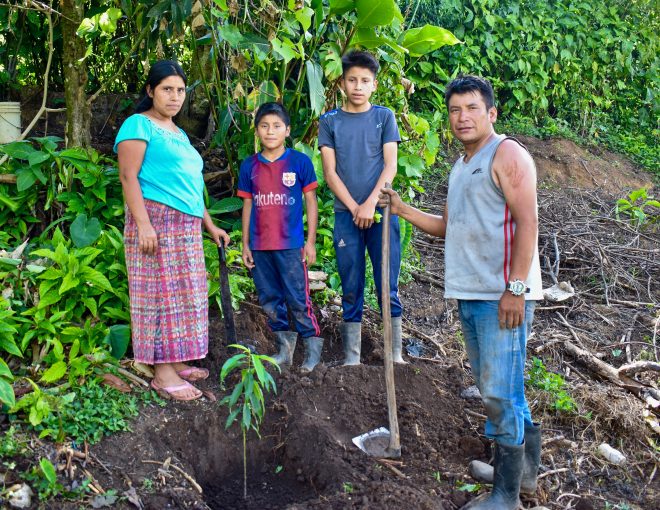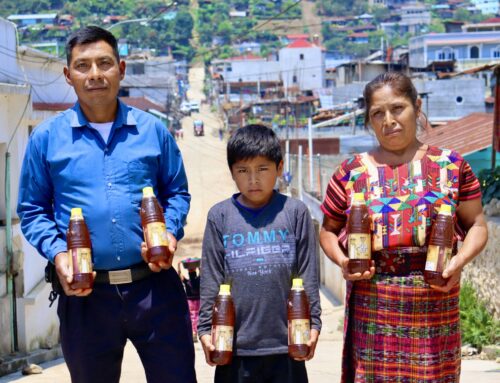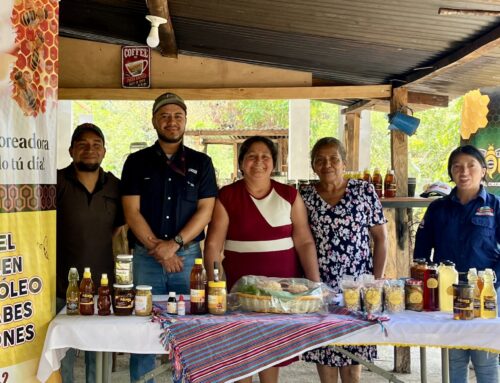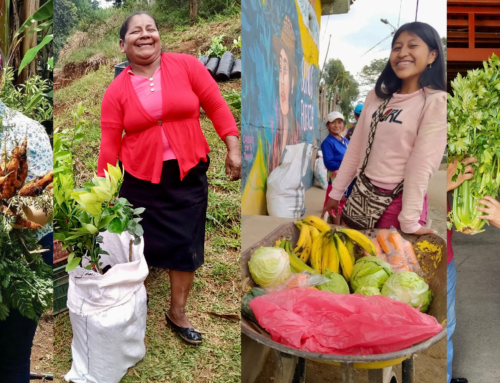by Cody Gallagher
Farming families are aware of the challenges they face, and have innovative ideas to address them. But they need support and resources to turn these ideas into action. Since we began working with Latin American coffee-farming families and co-ops 10 years ago, we’ve focused on co-creating community-appropriate resources so farmers can lead the way to building and sustaining food security in their own holistic way. And food security is not always just about food. Layered on top of farm and income diversification are youth leadership development, co-op capacity building, and opportunities for women to build their own businesses. Ultimately, it’s about ensuring every farming family has a choice in how they want to build a food-secure future – and the ability to make it a reality.
We’ve been looking to agroforestry as one of these holistic strategies that accomplishes multiple goals: Improving access to locally-grown, healthy food, providing year-round forage for bees and other pollinators on and around coffee farms, and restoring native forest systems to build climate resilience in rural farming communities. Thanks to new funding from Grow Ahead and Arbor Day Foundation, and building on our current support from Rick Steves and The Nell Newman Foundation, our partners at the SOPPEXCCA, Maya Ixil, and COMEPCAFE cooperatives are planting nearly 100,000 trees, shrubs, and melliferous plants on 580 coffee farms. It’s an exciting opportunity to strengthen environmental health. Our partners in Colombia, Guatemala, and Nicaragua have worked hard to prepare for this long-term investment in stewarding their land.
Along with offsetting carbon and improving biodiversity, the trees and plants selected by our partners are designed to improve food security. Each community is planting trees that can thrive locally, choosing hardwood trees for shade and pollinator food, fruit trees for consumption and local sales, and other plants to prevent soil erosion and improve water access for home gardens. The 580 families in this program have received plants, seeds, organic fertilizer, and other inputs for better plant health. With robust ongoing technical support, and education about food security and nutrition, they’re aiming to successfully establish and sustain a critical new resource, in this critical first year. We’re excited to see these investments take hold and, as always, we’re in awe of our hardworking co-op partners as they layer on this new strategy to sustain people and planet.

Teresa Medina Toma, a member of the Maya Ixil coffee cooperative, holds a fruit tree sapling she received as part of the co-op’s new agroforestry strategy.
Here’s how our cooperative parters are using agroforestry as a livelihood and food security strategy.

A member of COMEPCAFE cooperative receives banana corms, to be planted in her home garden.
COMEPCAFE, Colombia
150 COMEPCAFE families are adding 106 trees of 10 different species to their farms this year. Unfortunately, tree prices doubled after they received funding, due to the pandemic and disruptions in supply chains, and they could only afford to buy half the number of trees. But they came up with a brilliant solution: They’re sourcing the remaining trees from forest systems surrounding the community’s resguardo
(an indigenous territory) in Cauca, as community members are allowed to forage and engage in low-impact activities in the forest, like collecting seeds and seedlings. In all, 16,875 trees and other plants will be planted on 150 COMEPCAFE coffee farms this year.
We believe this “tree rescue” strategy will have a significant, positive impact on both environmental conservation and food security. As an organization, COMEPCAFE supports and promotes the recovery and use of traditional foods and recipes. In early conversations with the co-op, they told us that the loss of their cultural heritage — especially the loss of traditional foods and recipes — was a threat to family food security. Now, instead of buying trees commercially, COMEPCAFE has a way to sustain its progress by teaching families to rescue and conserve from the forest, through seed and seedling collection and cultivation, and nurtured in their own nurseries.
Maya Ixil, Guatemala
This year, nearly all of Maya Ixil’s 205 member-families are bolstering farm biodiversity with trees and plants to grow healthy food, while improving environmental supports for honey bees and other pollinators. In all, 25,500 trees and cover crops, and seeds for 6 food crops, will be planted in home gardens. Families are planting peach, lime, mandarin, and orange trees, along with nectar-producing chalum and basil seedlings, to feed honey bees and native pollinators.

Maya Ixil coffee farmers plant new fruit tree saplings alongside vegetables in their home garden.
Maya Ixil has never undertaken a project of this nature or scope, so together we’ve built the program from scratch, ensuring the co-op has the ability to successfully and independently manage and sustain this ambitious endeavor.

Carlos Evert of the SOPPEXCCA cooperative with fruit tree saplings for his farm.
SOPPEXCCA, Nicaragua
230 families at the 520-member SOPPEXCCA co-op are planting 2,400 hardwood trees, 3,000 fruit trees and thousands of edible plants and seeds to prevent erosion and build soil health on and around their coffee farms. A total of 55,400 trees and supporting plants will be added to farms and home gardens this year.
Like other rural farming communities, SOPPEXCCA was affected by movement and gathering restrictions due to COVID-19, so the co-op developed protocols for its staff and 520 member-families, to safely continue the work.
We succeed when farming families have choices, and agroforestry does just that. It provides farmers with more autonomy in deciding how they want to earn a living, care for their families, steward their land and the natural world around them. If you’d like to help bring trees to more farming families, please consider making a special donation as we head into Coffee Days and the 2021 giving season.

A Maya Ixil family plants fruit tree saplings on their farm.




